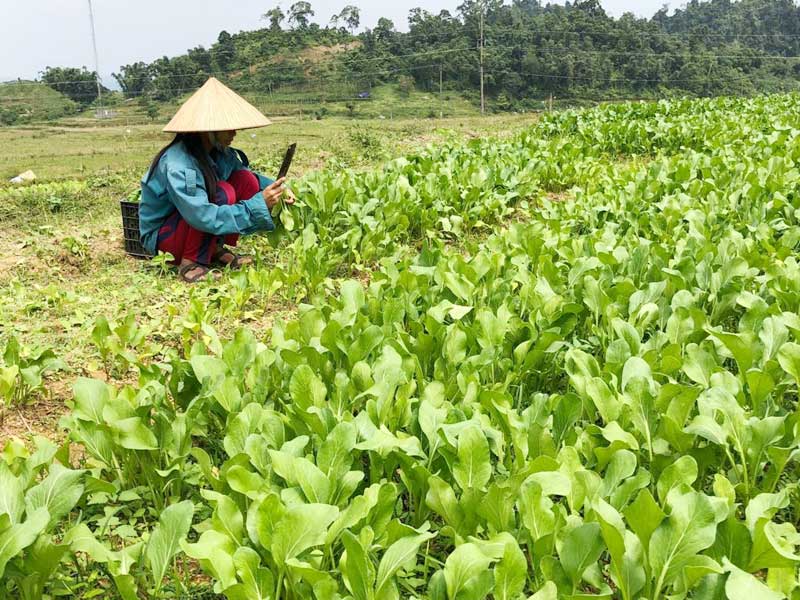
(HBO) - Tan Son commune, located in an extremely difficult area of Mai Chau district, is flourishing in agricultural production, which helps improve income and better living standards of local residents, and contributes to the new-style rural development in the locality.
Farmers in Tam Hoa village, Tan Son commune (Mai Chau district) are
growing vegetables in the production-consumption model, which has helped improve
their incomes.
The cultivable land of Bo Bau and Tam Hoa villages
of Tan Son commune is covered by the green colour of lime trees and vegetables.
Ha Van Dung, Chairman of the communal People’s Committee, said how to change the
structure of plants has long been the concern of the local authorities and
Party Committee.
From 2017, the landmark transformation has helped to bring hope for locals and improve
their livelihood. Production models coupled with consumption of key
agricultural products have been formed. Notably, a lime growing model - the
cooperation between local farmers and the Nafood Tay Bac Company - was formed.
A total of 40 households participating in
the model have been provided with training on science and farming techniques.
They have got helps to access loans through the district’s agricultural
development project for purchasing materials and fertiliser.
The model has been expanded in scale with
an area of 4.3 hectares. Households that join the model through shifting the cultivation
of cassava, maize and other ineffective plants to the growing of lime have
earned tens of millions of VND per crop.
Instead of selling products at low and unstable
prices, now products made by locals are purchased by enterprises with the
stable price at 15,000 VND/kg.
Another safe vegetable cultivation model in the production-consumption chain is
also actively implemented in the locality, and the area of this model is hoped
to increase by 10 ha in the end of 2018. Initiated in July 2018, the model
provided the two first products of cabbage and choy sum. All the cultivation areas
of vegetables meet VietGap
standards in terms of quality, output and value. With
the model, enterprises also buy products at the garden with the price committed
in the contract.
The family of Mrs. Ha Thi Y, one of households joining the model
in the Na Co Nao production area in Tam Hoa village said it is not
difficult to grow vegetables because her family has been provided vegetable farming
techniques.
The cultivation is also suitable with the investment ability of farmers, she stressed, adding that the cultivation
of this kind has helped local farmers increase their incomes by 2-3 times
compared to the growing of rice.
In Lac Thuy district, communes have been succeeded in promoting their One Commune-One Product (OCOP) products while others are still struggling to position their typical farming products in market. Some communes in the district still fail to have their products met OCOP programme’s requirements, while others have seen their certifications expired.
The inspectorate agency of Hoa Binh province has issued Official Dispatch No. 1090/TTr-PCTN to provincial departments, agencies, localities, business associations, enterprises, and investors regarding measures to improve informal component indexes of the Provincial Competitiveness Index (PCI).
Hoa Binh is taking concrete steps to improve its investment environment, with a strong focus on supporting businesses, settling obstacles for strategic investors, and creating opportunities for robust development in the coming years.
Under the blazing early summer sun, the construction site of Nhuan Trach Industrial Park (IP) in Luong Son district is abuzz with activities from dawn to dusk, a testament to the determination of the investor to meet their construction targets on schedule.



